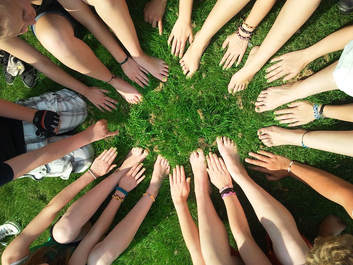
These are my paraphrases, but they are the gist of some of the instructions in Deuteronomy 22. At first glance, the only one that seems fair is the one about taking care of someone else’s animal, but a second look reveals the heart of these sundry rules and regulations. The crux of the matter is the importance of community. True relationship between the members of a town meant the people cared about one another. They looked out for each other’s welfare and were responsible for one another’s well-being.
*Having someone murdered nearby was serious business. Effort was made to locate the killer. If the search was unsuccessful, a town said, “We will take the blame. We were nearby and perhaps, too busy to notice someone was in distress.”
*If a youth ran wild and unruly, judgement was in the hands of the community, the people who had stepped in to help parents train and correct. Neighbors could vow, “Son, Daughter, we did everything we could to keep you out of trouble. Like your parents, we are heart-broken that this has come to you. As you die, see the faces of opportunity staring at you, faces of the many who tried to get you to choose right.”
*Animal care meant heeding someone’s livelihood. To disregard an animal in need was to disregard its owner’s need. The attitude, then, was to provide so that someone else’s source of provision wasn’t limited.
*Blueprints for building? Those, too, took the community’s needs into consideration. A rail along the roof planned for company. It said, “We will be hosting gatherings, and we want to fellowship with you in a way that ensures your and your family’s safety.”
*A husband’s false accusations were handled by the group, not just one in-law’s word against another’s. Neighbors stood with the girl’s parents to confront and to correct the lying spouse’s misdeed, thereby protecting the innocent and preserving the wife’s family’s reputation. Rumors had no air in which to swirl as lips were sealed with the power of truth. And truth was maintained even in the opposite circumstance. The men of the town were required to stone the tainted wife. Among them were those responsible for her indiscretions. They had to look in the face of the one they’d wronged, bear the guilt of hurting his fellow-man, and remember the death they were responsible for.
*Should an attack on someone’s betrothed occur in the city, there was aid on hand. Someone to defend the wronged young lady and someone to stand in the place of the groom-to-be.
It was all about community. To offend one was to offend all for each was responsible for his neighbor, and each bore the weight of that responsibility as well as the treasure of the gifts provided by sharing life and livelihood and the blessings of knowing support was always available.
There’s power in standing together. Babel proved that. The Law encouraged it. Now, the Church exemplifies it. Others have said it best, “United we stand. Divided we fall.” Like these unusual commands in Deuteronomy suggest, we should bear one another’s burdens, be on the lookout for others’ well-being, and be concerned about people’s welfare, relationships, and reputations. Perhaps, if we spent more time holding ourselves to that higher standard of responsibility to others, we’d spend a lot less time holding stones in our hands.
Tip/Tidbit: Who around you needs a helping hand? Is there a single mother who could use your support? A young couple who could use your financial know-how? A reputation you could salvage with your positive input? How might you help unify your family, your church, your community? Why not look for ways to hold yourself accountable to others and let them be accountable to you?
 RSS Feed
RSS Feed
